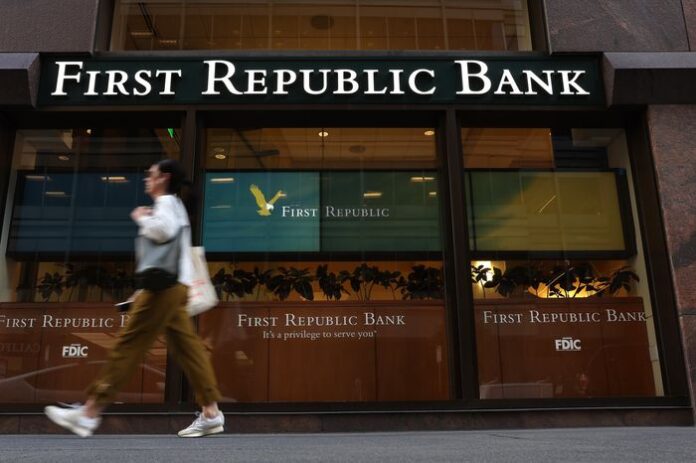NEW YORK: Amid the banking crisis, the federal regulators have taken control of the First Republic Bank which will be later sold to JPMorgan — the largest bank in the US, NBC reported Monday.
First Republic Bank marks the third bank in less than two months to fail.
In an announcement, The Federal Deposit Insurance Corporation (FDIC) said Monday that it had seized the bank and that JPMorgan Chase would be purchasing substantially all its assets and deposits.
It has become the second largest banking failure in US history with total assets of $229.1 billion at the closing time. The worth of assets is higher than the Silicon Valley Bank (SVB).
Though, depositors have chosen banks to make their deposits safe seeing the higher interest rates and after the failure of SVB earlier this year, First Republic Bank saw its depositors fall around 40% in the first quarter.
First Republic is among the medium-sized banks that were affected by the trend. Bank of America noted that as of mid-March, about 70% of its deposits were uninsured which means they were larger than the FDIC’s $250,000 guaranteed limit.
The $30 billion deposit by 11 peer banks in the mid of March could not restore customer confidence leading its stocks to fall more than %75 over the past 30 days.
Goldman Sachs Economic Research said: The scale of the San Francisco-based lender’s deposit losses was an outlier compared with other regional banks, which saw a roughly 5% decline in deposits on average in 2023.
He also added: Still, the rapid flight of deposits from First Republic had “created a lot of anxiety across the industry.
Additionally, the interest rate hike by the federal reserve also caused its uninsured deposits and many loans fixed with fixed long-term interest losing their value.
In a press release last week, First Republic said that it was seeking help to reshape its balance sheet after the massive deposit flight.
Friday night, the bank said: “We are engaged in discussions with multiple parties about our strategic options while continuing to serve our clients.”
According to a CNBC report, First Republic had been looking to sell assets to larger banks while it raised additional equity, but it was unclear if other banks would be willing to buy.
Bloomberg News reported Tuesday that the First Republic was looking to sell up to $100 billion of loans and securities to reshape its balance sheet.
The lender had already ruled out a full sale to another bank, CNBC reported.
By Friday afternoon, Reuters reported that an FDIC seizure was imminent after hopes of finding a private-sector solution fell through.
During the weekend, the government asserted itself to take bids on the First Republic, as the FDIC hoped to announce the closure of the firm alongside a purchase agreement.
JPMorgan Chase was in the lead.
JPMorgan Chase CEO Jamie Dimon said in a statement Monday that “Our government invited us and others to step up, and we did. Our financial strength, capabilities, and business model allowed us to develop a bid to execute the transaction in a way to minimise costs to the Deposit Insurance Fund.”
The 84 branches of First Republic Bank will open as JPMorgan Chase branches.
The cost estimated by FDIC of First Republic’s receivership will be about $13 billion, less than the $20 billion estimated as the cost of SVB failure.
Treasury Department spokesperson maintained that it encouraged that this institution was resolved with the least cost to the Deposit Insurance Fund, and in a manner that protected all depositors. The banking system remains sound and resilient, and Americans should feel confident in the safety of their deposits and the ability of the banking system to fulfil its essential function of providing credit to businesses and families.




